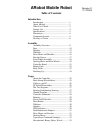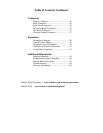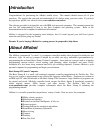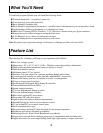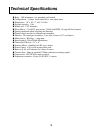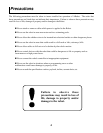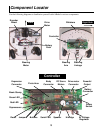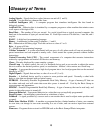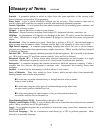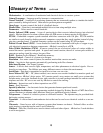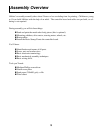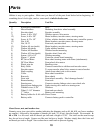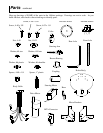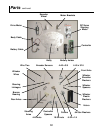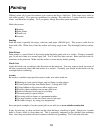
Glossary of Terms
6
Analog Signals – Signals that have values between on and off (1 and 0).
Android – A robot that has a human-like form.
Artificial Intelligence (AI) – A computer program that simulates intelligence like that found in
biological systems.
Artificial Life – Behavior that is simulated by a computer program or other machine that mimics some
or all aspects of biological life.
Baud Rate – The number of bits per second. In a serial signal from a typical personal computer, the
baud rate is the number of bytes per second times 10. Each byte consists of 8 data bits, 1 start bit, and 1
stop bit.
BASIC – A high-level programming language.
Binary – A numbering system using 2 numbers – 1 and 0.
Bit – Abbreviation for binary digit. Each bit can have a value of 1 or 0.
Byte – A group of 8 bits.
C – A high-level programming language.
Cellular Automata – A system constructed with an array of cells where each cell can act according to
preset instructions and can respond to nearby cells. Once started the system proceeds without further
instructions.
Central Processing Unit (CPU) - The central component of a computer that executes instructions
written by a programmer and controls I/O devices and memory.
Chaos – Disorder displayed by some complex systems.
Closed Loop – In motor control, the use of a feedback device such as an encoder to adjust the motor
driver to achieve the desired position, speed, or acceleration. ARobot’s drive motors are closed loop.
Compiler – A program that converts a high-level program into a low-level program that can be executed
directly by a CPU.
Digital Signals – Signals that can have a value of on or off (1 or 0).
Encoder – A feedback device used by a motor to sense position and speed. Normally a wheel with
holes or slots that are detected with an optical sensor.
EEPROM – Electrically Erasable Programmable Read Only Memory. A type of memory IC that can
be written and read, and will retain data even after power is turned off. Used by the Basic Stamp to
store programs and parameters.
EPROM – Erasable Programmable Read Only Memory. A type of memory that can be read only, and
retains its data after power is turned off.
Emergent Behavior – Unexpected behavior in a robot that was not explicitly programmed.
Expert System – An intelligent system based on a database of rules.
Feedback – A signal produced by a sensor such as an encoder that is used to adjust motor position and/
or speed.
Finite State Machine (FSM) – A machine or program that has a limited number of states, can examine
its own state, can change its own state according to a set of rules, and can receive input from external
sources.
Firmware – Programs that are stored on EPROM such as the Basic Stamps PBasic interpreter.




